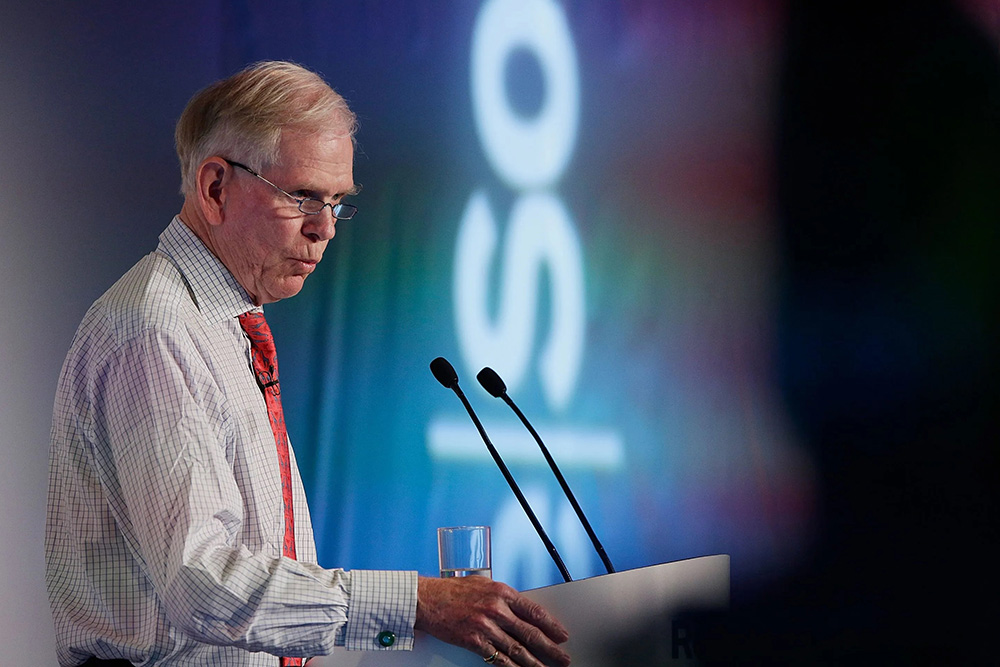
杰里米·格兰瑟姆是华尔街最受尊敬的投资者之一。
格兰瑟姆是位于美国波士顿的资产管理公司GMO的联合创始人,他曾经因为成功预测20世纪80年代的日本资产价格泡沫、90年代末的互联网泡沫和2008年金融危机前的美国房地产泡沫而名声大噪。
而现在,这位已经83岁的华尔街大佬却表示,尽管今年美股遭遇剧震,但真正的经济下行尚未到来。格兰瑟姆一直警告美国经济正在酝酿一个“超级泡沫”,他认为现在这个泡沫仍未挑破。
在8月31日的一份研究报告中,格兰瑟姆指出,当前的美股价格仍然“非常昂贵”,而且以历史经验看,像当下正在经历的这种高通胀,必然会导致股市价格缩水。再加上近几个月,欧洲的能源危机、全球性的食品安全问题、美联储(Federal Reserve)的大幅加息,以及全球性的政府支出放缓,全球经济的“基本面”已经开始“严重恶化”。
他在文中写道:“当前的超级泡沫表现出一种前所未有的危险性,包括各种资产估值过高的问题(比如债券、住房和股票价格都被严重高估,而且正在迅速失去势头)、大宗商品震荡的问题,以及美联储的鹰派立场问题。虽然每一轮经济周期都有其独特性,但是历史经验表明,最糟糕的时候还没有到来。”
格兰瑟姆坚持认为,在过去十年间,美联储和其他国家央行采取的宽松货币政策(例如近接于零的利率政策和量化宽松等),导致全球资产价格形成了一个“超级泡沫”,催生了一个投资者的狂欢时代。但当狂热成为一种普遍现象时,崩溃也就不远了。
格兰瑟姆也不认同今年夏天的股市反弹标志着一轮新牛市的开始。他指出,以历史经验看,在“超级泡沫”的消化过程中,总会出现几次短暂的市场回升。
他说:“超级破沫不同于其他事件,虽然历史上可供投资者研究的‘超级泡沫’不多,但它们也有一些明显的共同特征,其中之一就是熊市的反弹……今年夏天的反弹迄今完全符合这种模式。”
除了格兰瑟姆之外,华尔街有多位老将也发表过类似的言论,包括摩根士丹利(Morgan Stanley)的首席投资官迈克·威尔逊。威尔逊认为,今年6月以来的熊市反弹只不过是诱导投资者的一个“陷阱”(不过威尔逊并未将市场称作“泡沫”)。
格兰瑟姆还解释了一个“超级泡沫”破灭所要经历的典型阶段,并指出当前的经济环境已经非常符合历史模式。
“首先是泡沫的形成。其次是政治经济环境出现一些动荡,导致投资者意识到那种完美是无法持久的,就像今年上半年那样,这时估值就会有所下降。再次就是我们最近看到的——熊市反弹。第四也是最后,就是基本面的恶化,市场跌至低点。”
格兰瑟姆继续指出,今年上半年股市下跌的主要推手是通胀,而今年全年股市下跌的主要原因,则是企业利润的下降。不过最后,他对自己的预测也是有所保留的。
“如果熊市真的已经结束了,那么历史上美国超级泡沫的演变模式就将完全被打破——虽然到目前为止,这次超级泡沫的演变模式与历史经验如出一辙。但这也是可能的。每一轮经济周期都有其独特性,而且每个政府的反应都是不可预测的。但如果历史重演,这出戏就仍然将以悲剧结尾。我们只能希望这一次造成的损害可以小一些。”(财富中文网)
译者:朴成奎
杰里米·格兰瑟姆是华尔街最受尊敬的投资者之一。
格兰瑟姆是位于美国波士顿的资产管理公司GMO的联合创始人,他曾经因为成功预测20世纪80年代的日本资产价格泡沫、90年代末的互联网泡沫和2008年金融危机前的美国房地产泡沫而名声大噪。
而现在,这位已经83岁的华尔街大佬却表示,尽管今年美股遭遇剧震,但真正的经济下行尚未到来。格兰瑟姆一直警告美国经济正在酝酿一个“超级泡沫”,他认为现在这个泡沫仍未挑破。
在8月31日的一份研究报告中,格兰瑟姆指出,当前的美股价格仍然“非常昂贵”,而且以历史经验看,像当下正在经历的这种高通胀,必然会导致股市价格缩水。再加上近几个月,欧洲的能源危机、全球性的食品安全问题、美联储(Federal Reserve)的大幅加息,以及全球性的政府支出放缓,全球经济的“基本面”已经开始“严重恶化”。
他在文中写道:“当前的超级泡沫表现出一种前所未有的危险性,包括各种资产估值过高的问题(比如债券、住房和股票价格都被严重高估,而且正在迅速失去势头)、大宗商品震荡的问题,以及美联储的鹰派立场问题。虽然每一轮经济周期都有其独特性,但是历史经验表明,最糟糕的时候还没有到来。”
格兰瑟姆坚持认为,在过去十年间,美联储和其他国家央行采取的宽松货币政策(例如近接于零的利率政策和量化宽松等),导致全球资产价格形成了一个“超级泡沫”,催生了一个投资者的狂欢时代。但当狂热成为一种普遍现象时,崩溃也就不远了。
格兰瑟姆也不认同今年夏天的股市反弹标志着一轮新牛市的开始。他指出,以历史经验看,在“超级泡沫”的消化过程中,总会出现几次短暂的市场回升。
他说:“超级破沫不同于其他事件,虽然历史上可供投资者研究的‘超级泡沫’不多,但它们也有一些明显的共同特征,其中之一就是熊市的反弹……今年夏天的反弹迄今完全符合这种模式。”
除了格兰瑟姆之外,华尔街有多位老将也发表过类似的言论,包括摩根士丹利(Morgan Stanley)的首席投资官迈克·威尔逊。威尔逊认为,今年6月以来的熊市反弹只不过是诱导投资者的一个“陷阱”(不过威尔逊并未将市场称作“泡沫”)。
格兰瑟姆还解释了一个“超级泡沫”破灭所要经历的典型阶段,并指出当前的经济环境已经非常符合历史模式。
“首先是泡沫的形成。其次是政治经济环境出现一些动荡,导致投资者意识到那种完美是无法持久的,就像今年上半年那样,这时估值就会有所下降。再次就是我们最近看到的——熊市反弹。第四也是最后,就是基本面的恶化,市场跌至低点。”
格兰瑟姆继续指出,今年上半年股市下跌的主要推手是通胀,而今年全年股市下跌的主要原因,则是企业利润的下降。不过最后,他对自己的预测也是有所保留的。
“如果熊市真的已经结束了,那么历史上美国超级泡沫的演变模式就将完全被打破——虽然到目前为止,这次超级泡沫的演变模式与历史经验如出一辙。但这也是可能的。每一轮经济周期都有其独特性,而且每个政府的反应都是不可预测的。但如果历史重演,这出戏就仍然将以悲剧结尾。我们只能希望这一次造成的损害可以小一些。”(财富中文网)
译者:朴成奎
Jeremy Grantham is among Wall Street’s most respected investors.
The cofounder of Boston asset manager GMO is well known for having predicted Japan’s asset price bubble in the 1980s, the dot-com bubble of the late ’90s, and even the U.S. housing blowup that came before the 2008 financial crisis.
Now the 83-year-old Wall Street veteran is arguing that despite the stock market’s struggles this year, the economy’s real downturn has yet to come. Grantham has been warning of a brewing “superbubble,” and he says it’s yet to pop.
In a August 31 research note, the investor noted that stocks remain “very expensive” and high inflation like the economy is experiencing now has historically led their valuations to contract. He also claimed that global economic “fundamentals” have begun to “deteriorate enormously” in recent months, pointing to the energy crisis in Europe, global food insecurity, Federal Reserve interest rate hikes, and slowing government spending worldwide.
“The current superbubble features an unprecedentedly dangerous mix of cross-asset overvaluation (with bonds, housing, and stocks all critically overpriced and now rapidly losing momentum), commodity shock, and Fed hawkishness,” Grantham wrote. “Each cycle is different and unique—but every historical parallel suggests that the worst is yet to come.”
Grantham has consistently argued that the loose monetary policies of the Federal Reserve and other central banks, including near-zero interest rates and quantitative easing, helped create a “superbubble” in asset prices worldwide over the past decade, spawning an era of investor euphoria. And when euphoria becomes common, a collapse is usually around the corner, he argues.
Grantham also doesn’t buy the idea that the stock rally this summer marked the start of a new bull market, noting that “superbubbles” have historically featured brief market rallies.
“Superbubbles are events unlike any others: While there are only a few in history for investors to study, they have clear features in common,” he wrote. “One of those features is the bear market rally… This summer’s rally has so far perfectly fit the pattern.”
His comments echo statements made by multiple Wall Street veterans, including Morgan Stanley’s chief investment officer Mike Wilson, who has been arguing the bear market rally is nothing but a “trap” for misguided investors since June (although Wilson stops short of calling the market a bubble).
Grantham went on to explain the typical stages that superbubbles go through when they collapse, noting that the current economic environment looks very similar to the historical pattern.
“First, the bubble forms; second, a setback occurs, as it just did in the first half of this year, when some wrinkle in the economic or political environment causes investors to realize that perfection will, after all, not last forever, and valuations take a half-step back. Then there is what we have just seen—the bear market rally. Fourth and finally, fundamentals deteriorate and the market declines to a low,” he wrote.
Grantham also elaborated on how rising inflation was the key driver of stock market declines in the first half of the year, but falling corporate profit margins will be the main cause of losses through December. He ended his research note with an important caveat about his prediction, however.
“If the bear market has already ended, the parallels with the three other U.S. superbubbles—so far so strangely in line—would be completely broken. This is always possible. Each cycle is different, and each government response is unpredictable,” he said. “But…if history repeats, the play will once again be a Tragedy. We must hope this time for a minor one.”






